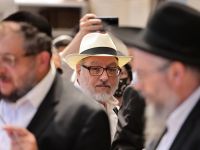In a report by Washington Post on Thursday, the paper raised question whether justice is being done in a case in which three westerners are accused of murdering a Briton.
Five months ago, the first of five explosions occurred in Riyadh, killing Briton Christopher Rodway on Nov. 17. The Saudi government has portrayed the blast as a gang-style murder carried out by Western expatriates involved in a multimillion-dollar black market for alcoholic beverages prohibited under the country's Islamic law. A Canadian, a Belgian and a Briton have been arrested for Rodway's death in the case, which not only has shattered the public calm that Saudi Arabia's rulers try so hard to maintain but also has raised diplomatic tension between the West and an important trading partner.
A televised confession by the three suspects has led to protests from embassies in the Saudi capital. The suspects' lack of access to a defense lawyer has highlighted complaints by international human rights groups such as Amnesty International about the Saudi criminal justice system, said the paper.
Saudi authorities have yet to provide a full picture of what they believe happened between the three defendants and Rodway. Nor have they implicated any Saudis in the investigation. They have tied the foreign defendants to a second blast five days later, but have not tried to explain the three most recent explosions, according to the Post.
The taped confessions from the first blast included vague references by the defendants about receiving "orders" to kill Rodway.
Western analysts were quoted in the report as claiming that alcohol smuggling of the magnitude underway in Saudi Arabia -- perhaps tens of millions of dollars' worth of illegal merchandise annually – “would likely involve the complicity of Saudi customs agents and perhaps a higher-level patron.”
However, beheading is unlikely, according to the sources quoted by Washington Post.
Diplomats, lawyers and others familiar with the case told the daily they regard execution as unlikely.
“Saudi Arabia beheads more than 100 people a year, but has never applied the penalty to the hundreds of thousands of Americans, Britons or other Westerners who work here in the oil industry or other jobs.” Already, they say, the search is underway for a compromise.
"We know what the West expects," said Salah Hejailan, a Saudi defense lawyer who said he might represent the three. The court, he said, may offer leniency if it is convinced the bombing stemmed from a private dispute among expatriates and represented no broader threat to public order.
There is still concern, however, about the outcome of a case that has become a symbol for the clash of cultures between Saudi Arabia's approximately 14 million citizens and the 7 million guest workers who supply much of the kingdom's management and labor. Not only has it cast an uncomfortable spotlight on an apparently widespread alcohol underground, it has highlighted double standards at work among different nationalities of expatriates.
Arab and Asian foreigners are routinely executed in the kingdom, not only for murder but for drug dealing as well, and no amount of diplomatic protest seems to prevent the outcome. When two British nurses were convicted five years ago in the murder of an Australian colleague, however, intense negotiations led to their pardon by King Fahd after the payment of about $1.5 million was posted by British business interests who did not want economic ties with the kingdom disrupted, according to the Post.
It added that a case involving a public bombing and black-market alcohol may be more difficult to navigate, particularly at a time of public discomfort with the role of Westerners in the kingdom.
The three men in custody -- Alexander Mitchell of Britain, William Sampson of Canada and Raf Skivens of Belgium -- have been implicated in the explosion that killed Rodway, a technician at a Saudi military hospital, and in the second bombing Nov. 22 that injured five others. The three subsequent explosions that have not been connected to them include two in Riyadh that diplomats say were less forceful and a booby-trapped juice carton left outside a supermarket in the eastern city of Khobar that blinded a British Coca-Cola executive.
Saudi Arabia’s application of Sharia or Islamic law has been under western criticism, especially from human rights groups and the EU. The kingdom, a key Islamic state, has no intentions to offer compromises in this regard, and have repeatedly asked critics to respect its choice – Albawaba.com
© 2001 Al Bawaba (www.albawaba.com)







